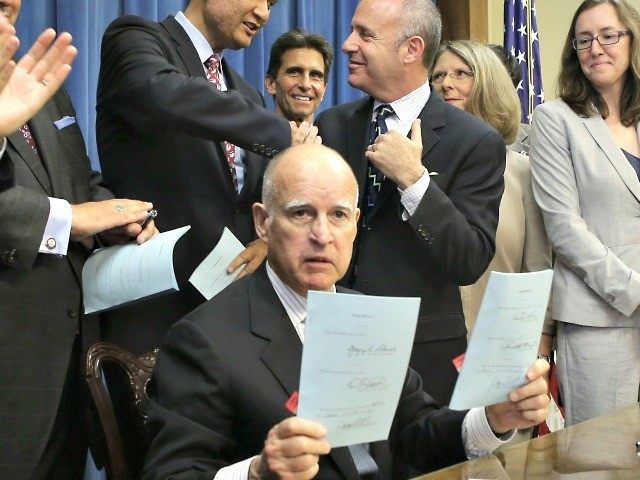When Gov. Jerry Brown kicked off the campaign for Proposition 30, his tax hike solution to California’s spending problems, he predicted a doomsday scenario if the tax measure failed.
“What do we do?” Brown wondered in the summer of 2012. “Do we dismantle the schools? Do we end the Highway Patrol? Do we open the prison doors?”
California voters, after $40 million of fear-mongering by Brown and his union allies, finally relented. But it turns out the quarter-cent increase in the state sales tax and four new income tax brackets weren’t needed after all.
So says the venerable Standard & Poor’s Ratings Services, which recently published its detailed analysis of the state’s financial picture.
“Would California still be in the red without the extra revenue from temporary tax increases made under Proposition 30?” Gabe Petek, the lead California analyst for Standard & Poor’s Ratings Services, recently asked. “Perhaps it’s counterintuitive, but the answer is no.”
Standard and Poor’s came to that conclusion by comparing current tax revenue with multi-year projections from the Legislative Analyst’s Office published in 2010, two years prior to Prop. 30. At that time, the state’s independent number-crunchers expected a structural deficit of $20.2 billion this year.
So, what’s changed? Expenditures are 15 percent below that five-year old LAO forecast, while revenues are up only 2 percent.
“Contrary to popular belief, elimination of prior deficits was mostly accomplished through lower spending, not higher revenues,” S&P concludes.
Another misconception cleared up by the rating agency: all of that additional money hasn’t gone to schools or public safety as promised. Eight percent of the Prop. 30 tax revenue collected to date has gone “toward repaying the state’s wall of debt.” This year, we’ll pay $7.87 billion in Prop. 30 taxes, nearly all of which will be spent paying off more debt.
Don’t get me wrong: debt repayment is a good thing. It’s helped take the state’s bond rating from negative in July 2011 to its current A-plus rating. However, when there’s a misunderstanding about where Prop. 30 funds are going, it ultimately paves the way for a tax extension or new tax increases.
The respected Dan Walters, a columnist for the Sacramento Bee, has written essentially the same thing that Standard & Poors has. His observation is that an improving economy has helped raise tax revenues and that Proposition 30 may have not been necessary. He has also written that some Proposition 30 funds have not always been spent as intended, going instead to prisons, public employee pay and welfare.
Last May, State Senator Mark Leno, a liberal Democrat from San Francisco, openly agonized that taxpayers might realize they were duped. “If we have $10 billion in reserve, how do we go to the voters in two or three years and say we have to extend their tax increase?” he said to a rally of his big government supporters.
A month into the new legislative session, we’ve already seen a slew of new tax proposals. Assembly Speaker Toni Atkins (D-San Diego) recently proposed a $2 billion road tax. Sen. Bob Hertzberg (D-Van Nuys) wants a $10 billion sales tax on services. Billionaire climate change activist Tom Steyer plans to push a new oil tax through the state legislature, and if that doesn’t work, he’ll qualify the measure for the 2016 ballot.
New taxes aren’t needed. Standard & Poor’s believes that “the state may be able to oversee the phase-out of its temporary taxes, and thus $6 billion to $8 billion in annual revenue, with almost no perceptible fiscal pressure.” New taxes could also throw us back into deficits. Under Proposition 98, any new taxes automatically mandate new spending commitments, which remain on the books even if the economy weakens or the stock market corrects.
New taxes aren’t California’s problem–spending is. As long as spending remains under control, the state can allow Prop. 30 to expire and avoid another revenue cliff.
James V. Lacy is the author of “Taxifornia” and a frequent guest on Fox Business News Channel’s Varney & Company.

COMMENTS
Please let us know if you're having issues with commenting.